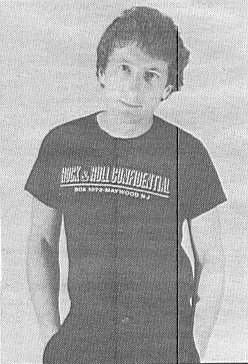
In 1978, I went to Seattle to conduct interviews with Strike survivors for a masters thesis I was writing on the strike and its political effects. I think I had already started "Shut it Down" and maybe a few other songs, but my experiences in Seattle led to many new songs. Some, like "Nothing Moved But the Tide" literally came from something someone said to me in an interview. When I returned to Santa Barbara, I spent the next year or so working on my masters thesis on the strike. I would work late into the evening or night almost every day, and then bike home, a 15 mile ride. The combination of the material in my head and the rhythm of the biking led to many new songs; often I would arrive home with an idea to scribble down.
In 79, I think, I got a letter from Mike Rawson, who was in law school. He said, "You know, you've been talking about this idea of a rock opera about the Strike for a long time. How about when you finish your masters and I finish law school, we go up to Seattle for some time and you/we finish it." Fortunately, shortly thereafter my then girlfriend, now wife, Sunny was accepted to library grad school at UWashington, so the whole thing fell together. She and I went up there in September of 1980; Mike joined us six months later, and we stayed until sometime in 1982. While there I worked a series of jobs--janitor, appliance installer, document coder--and these too led to some more songs. I can remember clearly waiting for an elevator in a high rise I was bringing refrigerators into and jotting down "Push" on a scrap of dry wall I picked up. By the time Mike joined me, I had 40 songs. He helped me edit them down, join some together to make a single song, and co-wrote a few that I'd been working on.
I came back to Santa Barbara in 1982, there to do my PhD, but also to get the album done. Sunny and I were living in a tiny house on Garden Street that had a full garage, probably as big as the house. I went dumpster diving for a week or so finding carpet and egg cartons, and tacked them up to muffle the sound (not that successfully according to some neighbors), turning the garage into a rehearsal and informal recording studio. I recruited a band by placing ads in the local papers and at music stores. There were some good things I had to offer: practice only once a week (so people could keep their other band connections), a very high royalty rate on any albums we sold, and most of all, the guarantee that we would make an album. Today, anyone can make an album (actually a CD) for almost nothing, but then you needed to go into a recording studio and get the vinyl pressed, all of which cost some money so actually making an album was a strong incentive. But I was honest from the beginning that actually selling a lot of them (though of course we hoped to do that) was a long shot, and everyone understood it was a gamble. I auditioned perhaps thirty singers and musicians and ended up with the six who formed The Fuse with me.
For two years we practiced once a week, spending six months on five or six songs, and then going into a studio and recording those, then beginning with a new six. Over time we graduated from 8-track studios to 16-track, and finally to Santa Barbara Studios, then the state-of-the-art 24 track studio in Santa Barbara where the big boys like Joe Walsh and Ringo sometimes recorded. Our total budget, from Mike's and my savings, was $5000 (for recording time and the actual manufacturing of 2000 copies), and this last move wouldn't have been possible except people there had heard about the project and got interested in it, squeezing us in at odd hours, often very late at night. In May of 1985 we finished the album; a little while later a friend and I spent a month up in Seattle trying to promo it and finding out how hard it is for an independent label to get heard on the radio. But that's another story...
As for the performance: After I had taken the job at Wesleyan I was contacted by Helen Lee of the Labor Center at Evergreen. We didn't know each other, but she had heard the album and wanted The Fuse to play a concert out there. I explained we had never played it live, that we hadn't played together in three years, and that we were scattered all over the country now. But she was persistent. She said they'd fundraise to bring us all to Seattle for four days, three days of practicing and then a concert at the Broadway Performance Hall. All of the band agreed to come (though some with great trepidation--could we really pull this off??) except Billy Bowne, the drummer, who was replaced by a friend of mine, Jack Whalen, who I had played some of the early Seattle songs with in a garage band called Jacks or Better in the late 70s. For a few months we each practiced with the record wherever we were. In late April of 1989 we went to Olympia, practiced almost nonstop for three days, and then on Mayday, May 1, gave the concert at the Broadway Performance Hall, one of the really great experiences of my life